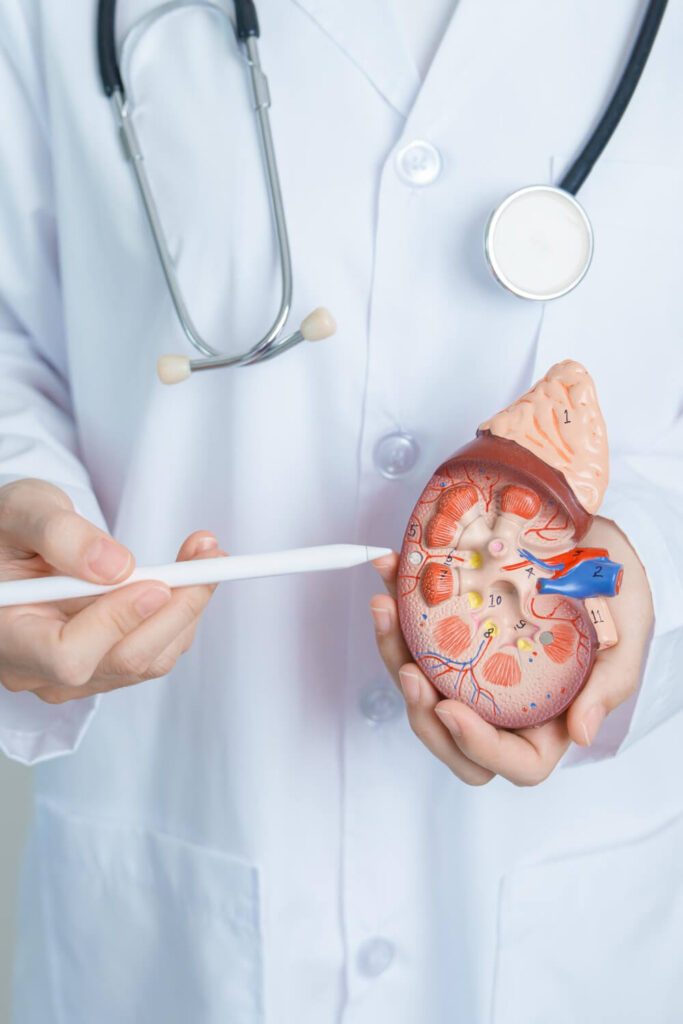Urology
administrator

Our Urology services offer specialized care for urinary tract and male reproductive system disorders. Our experienced urologists are dedicated to diagnosing and treating a wide range of urological conditions using advanced techniques and personalized treatment plans. We strive to provide comprehensive care that improves the quality of life for our patients.
Services Offered
1. General Urology:
- Diagnosis and treatment of urinary tract infections (UTIs)
- Management of kidney stones and bladder stones
- Treatment for overactive bladder and urinary incontinence
- Care for urinary retention and neurogenic bladder
2. Male Reproductive Health:
- Diagnosis and treatment of erectile dysfunction (ED)
- Management of male infertility and sperm disorders
- Treatment for Peyronie’s disease (penile curvature)
- Hormone replacement therapy for low testosterone
3. Prostate Health:
- Screening and management of benign prostatic hyperplasia (BPH)
- Diagnosis and treatment of prostatitis
- Prostate cancer screening (PSA testing) and biopsy
- Advanced treatments for prostate cancer, including surgery and radiation therapy
4. Kidney and Bladder Health:
- Diagnosis and treatment of kidney cysts and tumors
- Management of bladder dysfunction and interstitial cystitis
- Treatment for bladder cancer, including surgery and immunotherapy
- Care for hematuria (blood in urine) and proteinuria
5. Pediatric Urology:
- Treatment of congenital urological conditions in children
- Management of vesicoureteral reflux (VUR) and hydronephrosis
- Surgical correction of hypospadias and undescended testicles
- Care for pediatric urinary tract infections and enuresis (bedwetting)
6. Urologic Oncology:
- Diagnosis and treatment of kidney, bladder, prostate, and testicular cancers
- Minimally invasive and robotic-assisted surgical options
- Chemotherapy, radiation therapy, and immunotherapy for urologic cancers
- Coordination with oncology for comprehensive cancer care
7. Female Urology:
- Diagnosis and treatment of female urinary incontinence
- Management of pelvic organ prolapse and vaginal mesh complications
- Care for interstitial cystitis and painful bladder syndrome
- Treatment for recurrent UTIs in women
8. Minimally Invasive Urology:
- Laparoscopic and robotic-assisted urological surgeries
- Ureteroscopy and percutaneous nephrolithotomy for kidney stones
- Laser treatments for BPH and urinary strictures
- Endoscopic procedures for bladder and urethral conditions
9. Andrology:
- Diagnosis and treatment of male sexual dysfunction
- Management of conditions affecting male genitalia
- Surgical interventions for varicocele and hydrocele
- Counseling and treatment for gender dysphoria and transgender health
10. Urodynamic Testing:
- Comprehensive testing for urinary incontinence and bladder dysfunction
- Evaluation of voiding dysfunction and urinary retention
- Cystometry, uroflowmetry, and electromyography (EMG)
- Personalized treatment plans based on test results
Our Approach:
Our Urology services emphasize patient-centered care, focusing on accurate diagnosis, effective treatment, and preventive strategies. We utilize state-of-the-art technology and evidence-based practices to provide the highest quality of care. Our approach includes personalized treatment plans and ongoing support to ensure optimal urological health for our patients.
Our Team:
Our team consists of board-certified urologists, urologic surgeons, and specialized nursing staff. They collaborate with other healthcare providers to deliver comprehensive and coordinated care.

What to Expect:
When you visit our Urology services, you can expect:
- A thorough consultation and detailed medical history review
- Advanced diagnostic testing and procedures
- Personalized treatment plans based on your specific needs
- Continuous follow-up care and monitoring to manage your condition
How to Access Our Services:
You can access our Urology services by:
- Scheduling an appointment online or by phone
- Obtaining a referral from your primary care physician or specialist
- Visiting our clinic for an initial consultation and assessment
Common Urological problems:
- Kidney Stones
- Diet for Kidney Stone Prevention
- Bladder Infection (UTI) in Adults
- Urinary Retention
- Hematuria (Blood in the Urine)
- Erectile Dysfunction
- Prostate Enlargement (Benign Prostatic Hyperplasia)
- Interstitial Cystitis (Painful Bladder Syndrome)
DAYS OF OPERATION
- MONDAY – FRIDAY
TIME
- 8:00AM – 2:00PM

